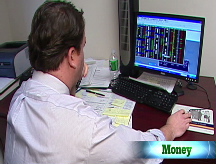Corporate bonds heat up
After getting crunched in the credit crisis, yield-hungry investors are dipping into corporate markets again.




NEW YORK (Fortune) -- An appetite for risk has returned to the fixed income market, where investors are beginning to spurn safe, low-yielding treasuries to buy corporate bonds instead. Corporations sold $70 billion worth of debt in the first half of January, according to Bloomberg data, hitting a pace not seen since May.
"People shunned corporate bonds through the end of 2008. Then, suddenly, a bunch of investors saw opportunity," says Tony Creszcenzi, the head of asset management at brokerage firm Miller Tabak.
2008 was a banner year for treasuries. As corporate credit markets melted down, risk-averse investors sent treasury prices soaring, driving 10-year yields down to almost 2% and yields on short-term treasuries to nearly zero.
But now many of those investors want out. Yields on 10-year notes have risen 22% over the last two weeks to 2.71%, compared to a 17% drop in December. Some bondholders are unloading treasuries ahead of more government debt sales to finance the government's enormous bailout packages. Others, says Creszcenzi, are simply tired of flimsy returns.
"At the beginning of the year, my clients began to say: 'Give me some exposure."
The flight to treasuries has coincided with corporate bond yields shooting up in recent months; Barclays' 10-year investment grade corporate bond index hit a high of 9.4% in October. For a relatively low-risk asset (investment grade bonds have high credit ratings), that's a massive premium over treasuries.
Now, says Creszcenzi, investors are going after that spread. A recent surge in demand for corporates has pushed their prices up and their yields down: Barclays' index of 10-year bonds are now yielding 7.06%.
If you bought corporate bonds at the end of last year, pat yourself on the back, says Ross Junge, a portfolio manager at Aviva Investors. If you haven't done so yet, there's still time: While Junge admits that their yields aren't as juicy as they were just a few weeks ago, he thinks there are significant gains to be made.
"We still see very good opportunities in the fixed income market," he says. "From a historical perspective, valuations remain cheap." Junge predicts that spreads on investment grade corporates will tighten another 0.75 percentage points. But because yields have been so high, he sees volatility in the coming months.
One forecast that's making bond buyers nervous comes from Moody's. The ratings agency predicted that the global default rate among speculative grade corporate bonds, which have low credit ratings, will jump to 15% this year, compared with 4% in 2008. But Kenneth Emery, the director of default research at Moody's, says that investment grade corporates rarely fail to pay up - and haven't reached default rates of more than 1% since the 1930's.
Mike Buchanan, chief credit analyst at Western Asset Management, believes current yields imply that more than 15% of investment grade bonds will default, but he doesn't see that happening. "To reach that level of defaults, you'd have to experience an environment worse than the Great Depression," he says.
While some investors fear that the recent rally is premature, Buchanan insists that the drop in yields is a sign of stabilization, not hasty optimism about the credit markets. "When you look at the magnitude of yields before, this is relatively minor," he says. "The market overshot, and high risk assets were oversold - all credit is cheap right now."
Buchanan cites debt issued by Berkshire Hathaway (BERK.A), Warren Buffett's financial services company, which is widely viewed as a bastion of soundness. Berkshire's 10-year bonds come with yields that are 2.2 percentage points higher than those of treasuries. Other corporate bonds offer even higher spreads: FedEx (FDX, Fortune 500) recently issued 10-year bonds with yields 4.5 points over treasuries.
In December, Fortune recommended several corporate bond funds as alternatives to treasuries. Since then, those funds have all posted gains:
The price on Vanguard's Intermediate Investment Grade Corporate Fund has jumped 2.8%, iShares iBoxx $ Investment Grade Corporate (LQD) has increased by 6.2%, and T. Rowe Price's Corporate Income Fund has risen 4.4%. Loomis Sayles Bond Fund, which holds riskier bonds, has posted a greater increase of 8.5%.
Buchanan believes that the corporate bond recovery is just beginning. "When investors feel comfortable getting back into credit - and were at the early stages of that - they gravitate towards lower risk products like investment grade bonds," he says. "You're going to see outperformance." ![]()
-
 The retail giant tops the Fortune 500 for the second year in a row. Who else made the list? More
The retail giant tops the Fortune 500 for the second year in a row. Who else made the list? More -
 This group of companies is all about social networking to connect with their customers. More
This group of companies is all about social networking to connect with their customers. More -
 The fight over the cholesterol medication is keeping a generic version from hitting the market. More
The fight over the cholesterol medication is keeping a generic version from hitting the market. More -
 Bin Laden may be dead, but the terrorist group he led doesn't need his money. More
Bin Laden may be dead, but the terrorist group he led doesn't need his money. More -
 U.S. real estate might be a mess, but in other parts of the world, home prices are jumping. More
U.S. real estate might be a mess, but in other parts of the world, home prices are jumping. More -
 Libya's output is a fraction of global production, but it's crucial to the nation's economy. More
Libya's output is a fraction of global production, but it's crucial to the nation's economy. More -
 Once rates start to rise, things could get ugly fast for our neighbors to the north. More
Once rates start to rise, things could get ugly fast for our neighbors to the north. More








